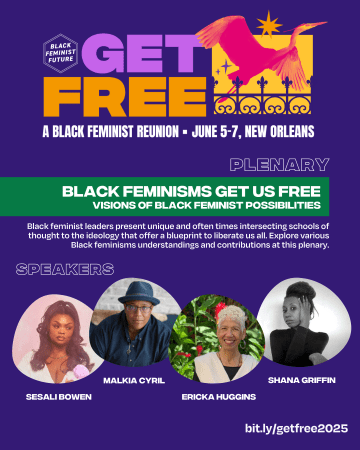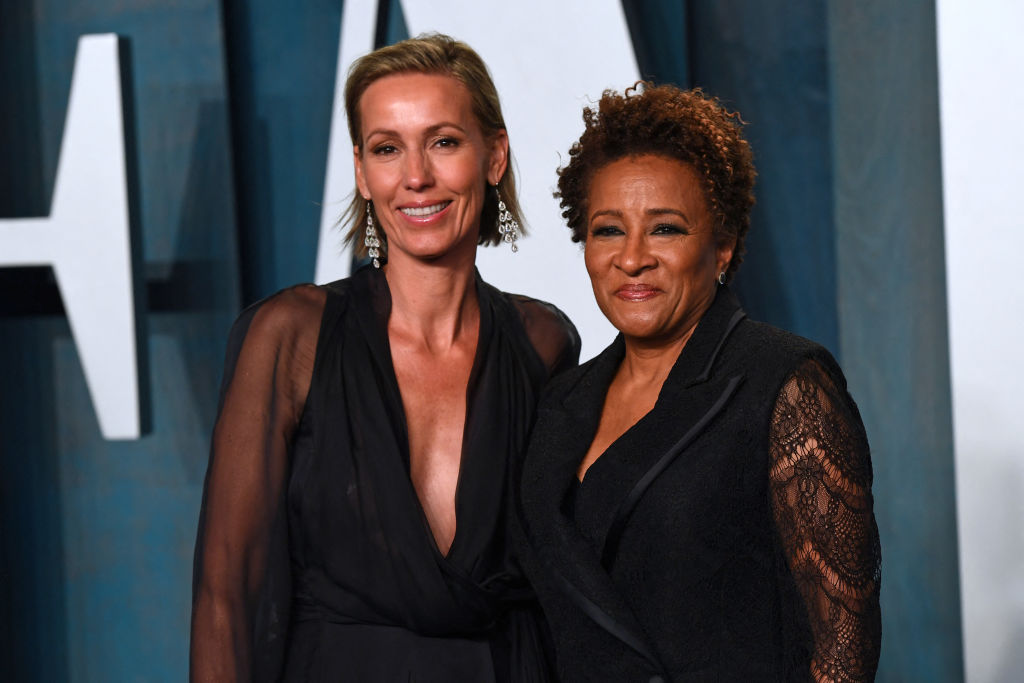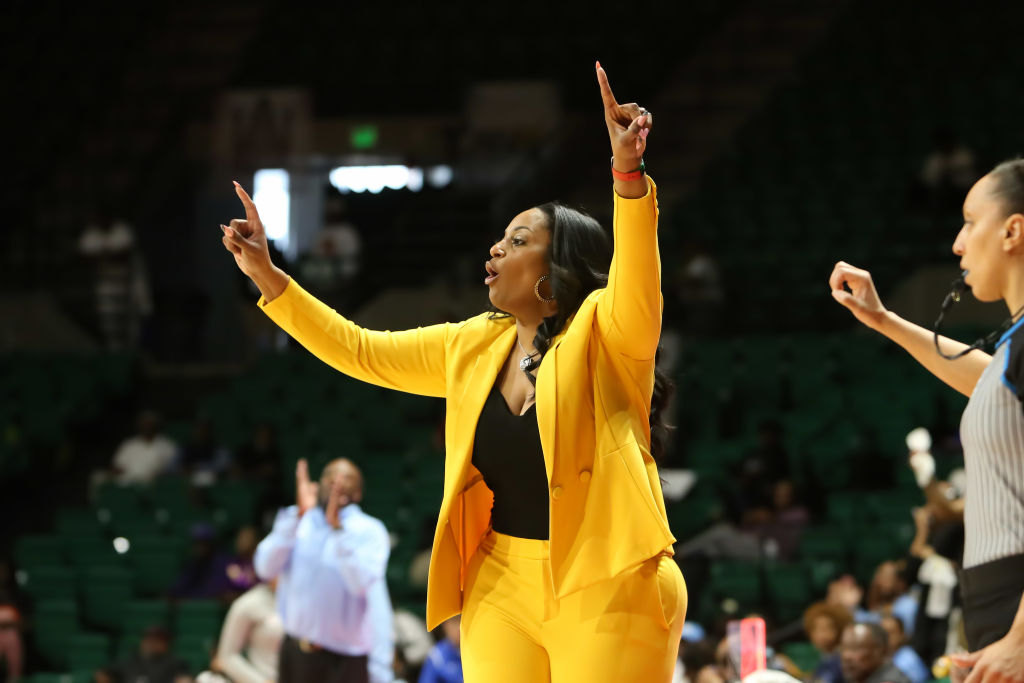Get Free 2025: Sesali Bowen Brings Trap Feminism To The Stage
Before She Takes The Stage At Get Free 2025, Sesali Bowen Breaks Down What Black Feminism Needs Now [Exclusive] - Page 2
Share the post
Share this link via
Or copy link

Later this week, hundreds of Black feminists from across the country will head to New Orleans for Get Free: A Black Feminist Reunion, the largest Black feminist gathering in the United States. Hosted by Black Feminist Future, the three-day event will take place June 5–7 at the Hyatt Regency New Orleans and promises restoration and reckoning for attendees.
The lineup includes a keynote by the iconic Angela Y. Davis, alongside movement leaders such as Ericka Huggins, Brittney Cooper, Charlene Carruthers, and Malkia Cyril. Programming spans the Scenes of Solidarity Film Festival, Irresistible Revolution Art Gallery, hands-on Liberation Learning Labs, and the celebratory North Star Gala.
“As fascism and oppression grow, Black feminist organizing offers a path forward rooted in care, power, and freedom,” said Paris Hatcher, founder of Black Feminist Future, whom MadameNoire‘s Tiffany Smith recently interviewed during a MadameNoire Live segment.
RELATED CONTENT: Candace Owens Blames Feminism For Women Knocking ‘Housewife’ Mindset, X Users Finds It Ironic
Centering The Bad Fat Black Girl

For many, Get Free represents a reunion of thinkers, organizers, artists, and everyday Black feminists reclaiming space in movement work. Sesali Bowen will be among the featured speakers, bringing her signature “trap feminist,” lens to the mainstage. Coined by Bowen, trap feminism bridges the gap between Black feminist theory and the lived experiences of Black women and queer individuals navigating spaces often dismissed by mainstream feminism. Analyzing the narratives within trap music—a genre frequently criticized for its misogyny—Bowen highlights how Black women and femmes assert agency, express sexuality, and claim power in environments that have historically marginalized us. Her work challenges respectability politics and centers the voices of those who have been systematically excluded from traditional feminist discourse.
Speaking to MadameNoire while packing for a speaking engagement in Cleveland before heading straight to New Orleans, Sesali’s voice was grounded, her words steady and reflective of lived experience.
“First of all, I am a student of Black feminism. All of my work literally has roots in a Black feminist foundation. I am a gender studies major. I have my master’s and my bachelor’s in gender and sexuality studies. So it’s just my bag, first of all. But when I finished my master’s, I didn’t continue the route. A lot of gender studies frameworks and ideologies are very siloed in the ivory towers of academia. I am really excited to bring another point of reference and another entry point to the conversation—as a Black feminist who is also not a scholar, because so many Black feminists aren’t in academia.”
In this current moment, where social media spreads language faster than context, Bowen points to present hurdles.
“When we think about a lot of the attacks that we have seen on education recently in the country, the departments that have been hit are our African American studies departments, our gender studies departments. When we think about just even college itself becoming harder to afford, harder to access—I think that it is also about a suppression of the liberal arts, of the theorizing and imagining and discourse and world-building and making sense of the world that is happening from [oppressed people]. I think that the powers that be would like to rewrite that history. They would like to erase that history and assert that patriarchy, for example, is just some natural way, some natural order of the world in a way that it should be. That is not true.”
She also acknowledges a generational shift in how we name the same systems:
“A lot of the discourse that I’m seeing online reveals that lack of a baseline understanding of even patriarchy. What I’m noticing is that younger people have new words for things that already exist and that have a very deep framework that have been rooted in scholarly studies. I saw someone on TikTok talking about the halo effect. I was like, ‘oh, are you just talking about like the beauty standards that are put on women? Are you talking about how beauty is a social capital that dictates how you are treated and how people view you, and how people are more likely to trust you and think of you in a good character versus have a negative character of you?’ Those are things that have been studied. Remember the doll test, when they used to put the Black doll with the white doll? These are things that have been studied, and now it’s just like a new word for it.”
“Even though they’re coming up with new words for it, they are still interested in the phenomenon itself. Even if they feel like they’re just coming up with this on their own, I am happy to see that people are still recognizing the patterns and the problems with patriarchy—and wanting to talk about why they are problems.”
What ‘Mainstream Feminism’ Gets Wrong
Love MadameNoire? Get more! Join the MadameNoire Newsletter
We care about your data. See our privacy policy.
Asked about how mainstream feminism continues to fail Black women, Bowen didn’t hesitate:
“I think the biggest lie is the idea of ‘mainstream feminism’ itself. Mainstream feminism just feels like an oxymoron to me because we live in a patriarchal culture. So if feminism were mainstream in any way, we would not live in a patriarchal culture. We would have a more feminist culture.”
“I think it is frustrating to see so many Black women, in particular, fall for that lie because they use it as an excuse not to engage in feminism at all. The truth is that Black women have also always been engaged in feminism and in feminist causes for as long as white women have. Some of our issues have looked different, but we’ve been engaged in the work of feminism for just as long. We do not need to look to white women to be the voice or be the engineers of a solution to what those issues are, because they are issues that are unique to us.”
Her insights were sharpened with analogy:
“I look at it like the example of hoteps,” Bowen said, alluding to the militant faux-philosophers known for worshiping pyramids, patriarchy, and poor relationship advice. “When we think about being pro-Black, which is like an umbrella statement for anybody who supports the liberation and advancement of Black people, hoteps often come in with all types of crazy conspiracy theories, toxic masculinity, flat earth—you know, whatever it may be. Even though that is [often] the visual image of pro-Blackness—somebody that’s very militant—nobody says ‘well, since the hoteps are so loud, I guess pro-Blackness isn’t it.’ We have such a lens to understand that pro-Blackness is an umbrella. Why aren’t we looking at feminism in that way?”
“Honestly, I am obviously a Black feminist ’cause I’m Black and I’m a feminist, but I usually just say I’m a feminist because that’s what I am. If a person doesn’t have the range to understand that I am approaching feminism from a unique perspective—as a Black woman, as a queer woman, as a fat woman—then like, okay, you know, those are the steps that you’re missing.”
Joy, Critique, and the Work of Liberation
Bowen doesn’t expect white women to hold space for her liberation. She expects that work to come from people like herself.
“I mean, I feel that way with white women all the time, but I also don’t look for them to include me. I don’t expect white women to have a feminism that relates to me and my struggles as a Black woman because they’re white. They’re not Black feminists.”
“When I walk into a room full of feminists that maybe do not share the same identity as me, it is my job to bring forth my identity in the way in which feminism works in my life with those identities into that space. I don’t always expect it to be there. I don’t believe in waiting on majority groups or privileged groups to help me or fix things for me. I feel that solutions for us have come from us.”
She also believes joy is inseparable from the work and from survival.
“That’s something I talk about with Trap Feminism a lot. I think that Black women in particular have always been very, very good at holding joy and struggle at the exact same time. I don’t always feel like I have to find a way to hold space for joy because that is a tradition of Black womanhood that comes very easily, comes very naturally, and that we get to be unapologetic about.”
“What I feel is to encourage folks who are in the struggle that they also still have room for joy, whatever that may look like for them.”
One of the biggest things Bowen says she had to release in order to move more freely in her own work was the idea that celebrating Black women meant never critiquing them.
“I think very recently I have had to let go of the deifying of Black women—this idea that to be in community with Black women is to never be critical of them, to never challenge, to never question, when there is also room for that. Because that’s what it means to really be in community with folks.” For Bowen, loving Black women means making space for honesty.
“ We also have to acknowledge that like any oppressed group, Black women also experience a lot of internalized misogyny that we have not addressed. Even from simple things, like how Black daughters are sometimes raised differently than Black sons, and what type of Black men are being raised and sent out into the world as a result of that. There are a lot of Black women, unfortunately, who’ll still center their heterosexuality, their desire for male companionship, male partnership, male attention, male validation…They lack an awareness of how that is influencing their work and how they’re able to advocate for Black women and Black girls. It’s not about demonizing those women. It’s not about saying ‘No,you can’t sit with us.’ It’s is not that, but we are at least allowed to call them in to say, ‘Hey, have you considered this?’
In A Better World
Asked what the world would look like if her work had full support, Bowen painted a picture equal parts practical and poetic.
“First of all, I think that we would be paid more. Black women would not be overrepresented in those of us who live below the poverty line. Black women would be able to take care of themselves and feed their families in ways that they are not always able to now.”
“Art would be so much better and richer. When folks are living under oppression, the amount of resources they have to commit to creative practices and crafts just aren’t there. How much music have we not heard? How much writing, how much literature have we not read yet just because there’s somebody who doesn’t have time to stop working long enough to create it?”
“I think the world would smell better,” she shared with an infectious chuckle. I just think that in general, people would live better because when Black women are able to experience liberation, that includes liberation for so many other people.”
Ready to connect, strategize, and mobilize with fellow Black feminists? Grab your ticket to “Get Free: A Black Feminist Reunion” in New Orleans here.
RELATED CONTENT: Hypocritical Things Male Feminists Do And Say
Related Tags
black feminism Black Feminist Future Black feminist theory Black women writers feminism and hip hop feminist movement Get Free 2025 MadameNoire exclusive Sesali Bowen trap feminism-

Meet Dominique Fils-Aimé, The Haitian-Canadian Star Redefining Jazz For A New Generation: ‘This is My Vision' [Exclusive]
-

Cooking With Purpose — How Brittney Williams Honors Her Caribbean Roots Through Food
-

9 Famous Lesbian Women Who Were Married To Men
-

Purpose Behind The Lens: How Nate Edwards Films The Extraordinary Inside The Everyday








